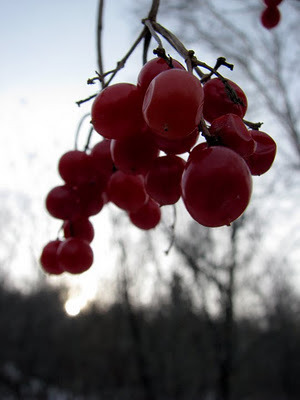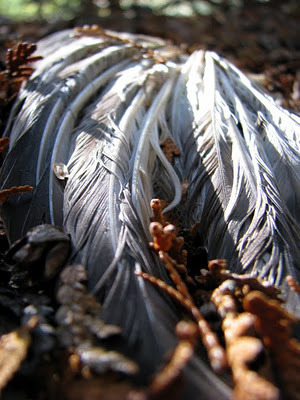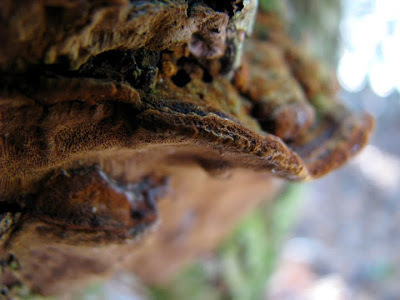Ariel Gordon's Blog, page 72
November 26, 2011
scrabble
Published on November 26, 2011 13:37
berrying
Published on November 26, 2011 13:36
Fungal infidelity
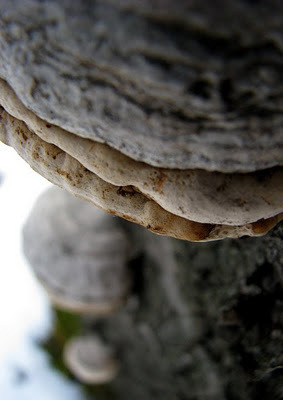
All photos Cosmopolitan Park, Saskatoon, SK. November 26, 2011.
* * *
What does it say about me that the only time/place I'm able to mushroom is in other cities and other forests?
(Saskatoon has had enough snow already that what isn't full of footprints is soapy...but it was still fun to rummage around on the banks of the Saskatchewan river, even if I had to be careful of my footing.)
Published on November 26, 2011 13:31
November 20, 2011
Out-of-Town-Authors: Rebecca Rosenblum
Short stories, big dreams
Winnipeg Free Press - PRINT EDITION
by: Ariel Gordon
Toronto writer Rebecca Rosenblum is a short-story specialist.
Which is similar to a poet's poet insomuch as they both describe a writer who focuses on a particular genre and who is invested in the genre's potentials and particularities.
 Rosenblum will be reading from her second collection on Thursday at McNally Robinson. She will be joined by fellow Bibioasis author Ray Robertson.
Rosenblum will be reading from her second collection on Thursday at McNally Robinson. She will be joined by fellow Bibioasis author Ray Robertson.
1) As a writer (i.e. someone whose artistic practice is predicated on time spent alone) how do you approach performance? What do you get out of it?
I used to be terrified to read in public, and I worked really hard to get better. Now I'm relaxed enough to occasionally surprise myself with how the act of voicing something that really illuminates — or alters — the meaning. So I learn about my work when I read, and I also learn from people's reactions to it. The fastest way to figure out where you're being self-indulgent is to read it to an audience and feel for the moment when they go dead.
2) What do you want people to know about The Big Dream?
That it exists? Um, that it's a book about people who work, who have jobs and lives and fall in love and get sick and eat sandwiches and care about each other, but sometimes not enough or not in the right ways.
3) Will this be your first time in Winnipeg? What have you heard?
I've taken two trips to Winnipeg and both were wonderful. One thing I heard about Winnipeg before I went there is that they are famous for corn mazes. So when I told my Winnipegger friend Stephanie that I would be coming, and she asked what I wanted to do, I told her, "Oh, the corn maze, of course." So, being the awesome friend she is, she looked up a corn maze and when I arrived she drove me way out of town. This was September, glorious weather, but it had rained that week, and it was so sloppy I had to take off my shoes and stockings and go barefoot through the maze. It was hilarious and disgusting. At the end, I was like, "Wow, so this is why Winnipeg is famous for corn mazes." And Stephanie, who had lived there all her life, was like, "Um, no, we're not, actually." I can no longer remember who told me that, but they completely made it up! I still enjoyed the maze, though.
4) What are you reading right now? What are you writing right now?
I am reading Lynn Coady's The Antagonist. It really is as good as everyone says it is, very meta and intellectually challenging, while still being completely human and relatable. And very, very funny. I am currently writing...this interview. I actually have been spending most of my free time on interviews or readings or presentations these days.
5) Why was it important to you to set The Big Dream's stories in the workplace?
The confectionary idea that I see in a lot of fiction, that life happens after six and on weekends, is not true to me, nor to anyone who has ever faced unemployment in a bad economy, or overheard a colleague crying in the bathroom, or had a really excellent night at the holiday party. It all matters, it's all real life — I wanted to show that.
Ariel Gordon is a Winnipeg writer.
Winnipeg Free Press - PRINT EDITION
by: Ariel Gordon
Toronto writer Rebecca Rosenblum is a short-story specialist.
Which is similar to a poet's poet insomuch as they both describe a writer who focuses on a particular genre and who is invested in the genre's potentials and particularities.
 Rosenblum will be reading from her second collection on Thursday at McNally Robinson. She will be joined by fellow Bibioasis author Ray Robertson.
Rosenblum will be reading from her second collection on Thursday at McNally Robinson. She will be joined by fellow Bibioasis author Ray Robertson.1) As a writer (i.e. someone whose artistic practice is predicated on time spent alone) how do you approach performance? What do you get out of it?
I used to be terrified to read in public, and I worked really hard to get better. Now I'm relaxed enough to occasionally surprise myself with how the act of voicing something that really illuminates — or alters — the meaning. So I learn about my work when I read, and I also learn from people's reactions to it. The fastest way to figure out where you're being self-indulgent is to read it to an audience and feel for the moment when they go dead.
2) What do you want people to know about The Big Dream?
That it exists? Um, that it's a book about people who work, who have jobs and lives and fall in love and get sick and eat sandwiches and care about each other, but sometimes not enough or not in the right ways.
3) Will this be your first time in Winnipeg? What have you heard?
I've taken two trips to Winnipeg and both were wonderful. One thing I heard about Winnipeg before I went there is that they are famous for corn mazes. So when I told my Winnipegger friend Stephanie that I would be coming, and she asked what I wanted to do, I told her, "Oh, the corn maze, of course." So, being the awesome friend she is, she looked up a corn maze and when I arrived she drove me way out of town. This was September, glorious weather, but it had rained that week, and it was so sloppy I had to take off my shoes and stockings and go barefoot through the maze. It was hilarious and disgusting. At the end, I was like, "Wow, so this is why Winnipeg is famous for corn mazes." And Stephanie, who had lived there all her life, was like, "Um, no, we're not, actually." I can no longer remember who told me that, but they completely made it up! I still enjoyed the maze, though.
4) What are you reading right now? What are you writing right now?
I am reading Lynn Coady's The Antagonist. It really is as good as everyone says it is, very meta and intellectually challenging, while still being completely human and relatable. And very, very funny. I am currently writing...this interview. I actually have been spending most of my free time on interviews or readings or presentations these days.
5) Why was it important to you to set The Big Dream's stories in the workplace?
The confectionary idea that I see in a lot of fiction, that life happens after six and on weekends, is not true to me, nor to anyone who has ever faced unemployment in a bad economy, or overheard a colleague crying in the bathroom, or had a really excellent night at the holiday party. It all matters, it's all real life — I wanted to show that.
Ariel Gordon is a Winnipeg writer.
Published on November 20, 2011 20:08
November 19, 2011
Toronto: Toronto Women's Bookstore, Nov. 3
So my publisher set me up with Laura Lush.
And she was dream date/co-reader. She filled the room with her friends and colleagues, she used ACTUAL REFERENCES TO MY POEMS in her introduction, and then she took me home to Guelph.
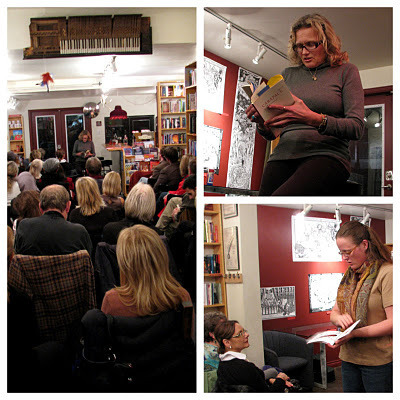 I will always remember tearing across Union Station, laden down with my bags, following Laura, who was deathly afraid of missing the night train to Guelph.
I will always remember tearing across Union Station, laden down with my bags, following Laura, who was deathly afraid of missing the night train to Guelph.
Her arms were full of flowers, of course. From her friends and colleagues, who laughed and sighed and bought out Toronto Women's Bookstore's cache of recent Palimpsest titles.
After we filled ALL of Laura's vases with flowers, I slept on the floor of her office, under a GG poster from the year her Hometown was nommed, her computer behind me, her bookshelves to one side.
All good sleepy-time influences, to my mind...and I slept very well.
* * *
Between our trainward sprint and our reading, Laura and her friends and my friend Red and I went down the street to a bistro. Red proceeded to trade me a copy of How to Prepare for Flooding for half a bottle of cava, which we drank over platters of frog's legs and smoked fish.
It had been nearly 15 years since Red and I had seen each other, but it was if no time had passed at all.
Except we both kind of sort of look like adults now.
* * *
There are lots of reasons to write but sometimes, publishing and attempting to get word out about the thing you've published can be humbling. Especially if you're publishing poetry.
And I understand. You win people over to poetry one person at a time, one poem at a time...but even so, it can be disheartening. So much work for so little (apparent) effect!
Which is why readings like this are like humbugs: you can savour them a long time.
Thanks to Laura for her generosity and her poems. Thanks for TWB for the venue and the pre-reading tea.
Finally, thanks to Dawn from Palimpsest for the blind date!
And she was dream date/co-reader. She filled the room with her friends and colleagues, she used ACTUAL REFERENCES TO MY POEMS in her introduction, and then she took me home to Guelph.
 I will always remember tearing across Union Station, laden down with my bags, following Laura, who was deathly afraid of missing the night train to Guelph.
I will always remember tearing across Union Station, laden down with my bags, following Laura, who was deathly afraid of missing the night train to Guelph.Her arms were full of flowers, of course. From her friends and colleagues, who laughed and sighed and bought out Toronto Women's Bookstore's cache of recent Palimpsest titles.
After we filled ALL of Laura's vases with flowers, I slept on the floor of her office, under a GG poster from the year her Hometown was nommed, her computer behind me, her bookshelves to one side.
All good sleepy-time influences, to my mind...and I slept very well.
* * *
Between our trainward sprint and our reading, Laura and her friends and my friend Red and I went down the street to a bistro. Red proceeded to trade me a copy of How to Prepare for Flooding for half a bottle of cava, which we drank over platters of frog's legs and smoked fish.
It had been nearly 15 years since Red and I had seen each other, but it was if no time had passed at all.
Except we both kind of sort of look like adults now.
* * *
There are lots of reasons to write but sometimes, publishing and attempting to get word out about the thing you've published can be humbling. Especially if you're publishing poetry.
And I understand. You win people over to poetry one person at a time, one poem at a time...but even so, it can be disheartening. So much work for so little (apparent) effect!
Which is why readings like this are like humbugs: you can savour them a long time.
Thanks to Laura for her generosity and her poems. Thanks for TWB for the venue and the pre-reading tea.
Finally, thanks to Dawn from Palimpsest for the blind date!
Published on November 19, 2011 17:03
November 16, 2011
PBN: E.D. Blodgett
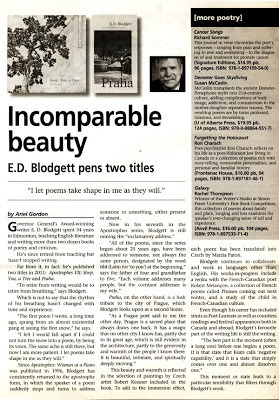
* * *
From the summer 2011 issue of Prairie books NOW.
* * *
The final quote from this square story, which did not fit on my rectangular flatbed scanner, is a humdinger and so worth including:
"That the world, no matter how brutal and mindless it is tending to be, is a place of incomparable awe." - E.D. Blodgett
Published on November 16, 2011 08:29
November 14, 2011
Out-of-Town-Authors: Alison Pick
PADDLES and potty training
Winnipeg Free Press - PRINT EDITION
by: Ariel Gordon
Toronto writer Alison Pick is responsible for two books of poems, two novels, and a two-year-old daughter.
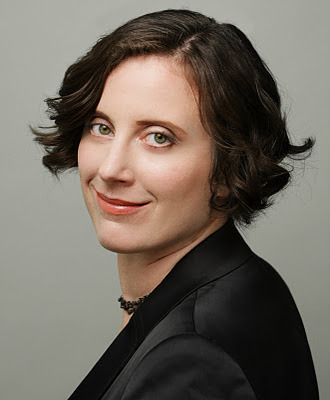 Though Pick acquired an early reputation for her nature writing, her most recent novel, Far to Go, explores how family histories intersect with historical events such as the Holocaust.
Though Pick acquired an early reputation for her nature writing, her most recent novel, Far to Go, explores how family histories intersect with historical events such as the Holocaust.
Pick will read Nov. 17 with Rhea Tregebov as a part of the Tarbut Festival of Jewish Culture at the Rady Jewish Community Centre.
1) As a writer (i.e. someone whose artistic practice is predicated on time spent alone) how do you approach performance? What do you get out of it?
I'm a classic introvert - not that I'm shy, but I thrive in solitude rather than in big groups of people - so I always have to spend some time ahead of a performance going over my notes and thinking about exactly what I'll say. My worst nightmare is having to go in front of an audience without time to prepare. That said, I do love the chance to talk about Far to Go, a book that is especially dear to my heart, and to have the opportunity to meet my readers.
2) What do you want people to know about Far to Go?
Far To Go tells the story of a Czech Jewish family in the late '30s, during the lead-up to the Second World War. Although the book is decidedly not autobiographical, my great-grandparents died in the Holocaust, and the book is written in their memories. My grandparents escaped Nazi-occupied Czechoslovakia, came to Canada and renounced their Judaism. They had been essentially non-practising, and they were afraid that what was happening in Europe could happen here as well. My dad grew up not knowing he was Jewish, and I only found out the truth by accident as a young teenager. So writing Far to Go was a way for me to imagine what it meant to be the particular type of Jews my grandparents were in the particular historical moment in which they lived.
3) Will this be your first time in Winnipeg? What have you heard?
I've been to Winnipeg twice before. The first was to read from my 2003 poetry collection Question & Answer. The second time was on a publicity stop as part of a cross-Canada canoe trip I took to raise money and awareness for mental illness. I had a friend who paddled the whole country over the course of three summers, and I joined her for the middle leg. After 60 days in the woods I was over the moon about being able to take a shower, pick up mail, eat a fresh salad.
4) What are you reading right now? What are you writing right now?
I've got a two-year-old daughter, so I'm really not reading much outside of books about temper tantrums and potty training. I am, in fits and starts, enjoying Julie Orringer's The Invisible Bridge and Charlotte Gill's Eating Dirt. In terms of writing, I'm working (slowly!) on a memoir that arose out of Far to Go. It explores a depression I suffered while I was researching and discovering my family's hidden Jewish history, and the ways in which the decisions of our ancestors can echo down generations, affecting the present in very real ways.
5) Canoe trips have featured in both your fiction and your poetry. How is writing about canoeing like and unlike actual canoeing?
The last big canoe trip I took was in 1999 - these days I'm lucky if I get out for a day or two every summer. But I'm still passionate about the wilderness in the same way I am about writing. Both seem to bring me home to myself, to make the world feel more hospitable, more peaceful. And certainly a long canoe trip is not dissimilar to the writing of a novel in terms of the patience, persistence and sheer grunt work required. That said, at this point in my life I can live without those epic canoe trips, whereas if I had to live without writing I'd be a very unhappy person indeed.
Ariel Gordon is a Winnipeg writer.
Winnipeg Free Press - PRINT EDITION
by: Ariel Gordon
Toronto writer Alison Pick is responsible for two books of poems, two novels, and a two-year-old daughter.
 Though Pick acquired an early reputation for her nature writing, her most recent novel, Far to Go, explores how family histories intersect with historical events such as the Holocaust.
Though Pick acquired an early reputation for her nature writing, her most recent novel, Far to Go, explores how family histories intersect with historical events such as the Holocaust.Pick will read Nov. 17 with Rhea Tregebov as a part of the Tarbut Festival of Jewish Culture at the Rady Jewish Community Centre.
1) As a writer (i.e. someone whose artistic practice is predicated on time spent alone) how do you approach performance? What do you get out of it?
I'm a classic introvert - not that I'm shy, but I thrive in solitude rather than in big groups of people - so I always have to spend some time ahead of a performance going over my notes and thinking about exactly what I'll say. My worst nightmare is having to go in front of an audience without time to prepare. That said, I do love the chance to talk about Far to Go, a book that is especially dear to my heart, and to have the opportunity to meet my readers.
2) What do you want people to know about Far to Go?
Far To Go tells the story of a Czech Jewish family in the late '30s, during the lead-up to the Second World War. Although the book is decidedly not autobiographical, my great-grandparents died in the Holocaust, and the book is written in their memories. My grandparents escaped Nazi-occupied Czechoslovakia, came to Canada and renounced their Judaism. They had been essentially non-practising, and they were afraid that what was happening in Europe could happen here as well. My dad grew up not knowing he was Jewish, and I only found out the truth by accident as a young teenager. So writing Far to Go was a way for me to imagine what it meant to be the particular type of Jews my grandparents were in the particular historical moment in which they lived.
3) Will this be your first time in Winnipeg? What have you heard?
I've been to Winnipeg twice before. The first was to read from my 2003 poetry collection Question & Answer. The second time was on a publicity stop as part of a cross-Canada canoe trip I took to raise money and awareness for mental illness. I had a friend who paddled the whole country over the course of three summers, and I joined her for the middle leg. After 60 days in the woods I was over the moon about being able to take a shower, pick up mail, eat a fresh salad.
4) What are you reading right now? What are you writing right now?
I've got a two-year-old daughter, so I'm really not reading much outside of books about temper tantrums and potty training. I am, in fits and starts, enjoying Julie Orringer's The Invisible Bridge and Charlotte Gill's Eating Dirt. In terms of writing, I'm working (slowly!) on a memoir that arose out of Far to Go. It explores a depression I suffered while I was researching and discovering my family's hidden Jewish history, and the ways in which the decisions of our ancestors can echo down generations, affecting the present in very real ways.
5) Canoe trips have featured in both your fiction and your poetry. How is writing about canoeing like and unlike actual canoeing?
The last big canoe trip I took was in 1999 - these days I'm lucky if I get out for a day or two every summer. But I'm still passionate about the wilderness in the same way I am about writing. Both seem to bring me home to myself, to make the world feel more hospitable, more peaceful. And certainly a long canoe trip is not dissimilar to the writing of a novel in terms of the patience, persistence and sheer grunt work required. That said, at this point in my life I can live without those epic canoe trips, whereas if I had to live without writing I'd be a very unhappy person indeed.
Ariel Gordon is a Winnipeg writer.
Published on November 14, 2011 06:30


